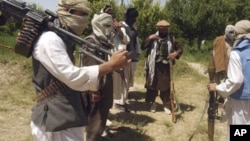A key figure in high-level talks between the Afghan government and the Taliban is allegedly a Taliban impostor. Western diplomats close to the talks tell The New York Times and The Washington Post newspapers that Afghan officials thought they had been talking to a top Taliban commander named Akhtar Mohammad Mansour. But it now appears the man is merely a shopkeeper from the Pakistani city of Quetta. A Western diplomat told the Times that officials "gave him a lot of money."
Afghan President Hamid Karzai dismissed the allegations during a news conference Tuesday in Kabul. He called the foreign media reports "propaganda."
VOA reporter Iftikhar Hussain spoke with Ismail Khan, a contributor to the New York Times, and the resident editor of Pakistan's Dawn newspaper.
This is an odd situation for the Afghan government and NATO to admit they may have been duped by an impostor in such important negotiations. What is your reaction?
"In their desperate search for contacts with the Taliban, the Americans, or for that matter, NATO officials, may have blundered by mistaking somebody for a senior Taliban leader. Although I think it is unlikely that any such Taliban leader would go for such a surreptitious meeting in Kabul and then also take money. It is a total rip-off and it is quite unlike the Taliban, unless, of course, this was an orchestrated, staged meeting. Otherwise it seems very, very unlikely that a senior Taliban leader may have gone there and taken money to arrange for more Taliban leaders to join talks at a later stage."
The media reports say that the man's identity is not clear, but that he came from Pakistan. Why would Pakistan do that?
"The report suggests that the Taliban leader came from Pakistan, but this is the general assessment or assumption is that the entire Taliban leadership, or the Quetta shura, is based in Pakistan and that they operate out of Pakistani safe-havens. So he may have gone from Pakistan, but whether Pakistan actually facilitated his travels from Pakistan to Afghanistan and to enable him to participate in the peace talks, is another matter. So I think that is something which remains unanswered at this moment."
Do you think this report is going to result in more security and background checks for participants in the Afghan peace negotiation process?
"The story is still very, very confusing. As you may know, there are still are still some Afghan officials who believe that the guy who said he was Mullah Akhtar Mohammad Mansour was actually Mullah Akhtar Mohammad Mansour. So they are still keeping their fingers crossed as far as his identity is concerned. But it just goes to show the lack of deep knowledge about the Taliban leadership within the American establishment or the security establishment. And for that matter, the Afghan and NATO military and security establishment is really troubling. The whole question of the counter-insurgency in Afghanistan is focused on defeating and dismantling the Taliban. If this is the level of their knowledge about the Taliban leadership, it is really troubling. I'm not saying this is a one-off incident involving somebody actually ripping-off the Americans of their dollars. There have been instances in the past as well. These things happen in this kind of 'business.' But the biggest problem is that the Afghans and the Americans and NATO put together have no idea, zero knowledge, of the senior Taliban leadership, although they have been clamoring about the presence of the Afghan Taliban leadership in Pakistan. But the knowledge and the identity and credentials of all these Taliban leadership is virtually zero."




